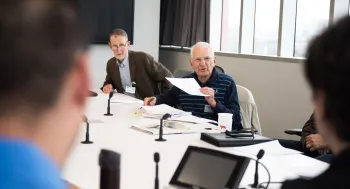Submitted on June 1, 2016

When it comes to fine-tuning care for men with prostate cancer, UCSF relies on a dedicated team of patient advocates—volunteers who have undergone treatment themselves and want to help make the experience better for others.
The department’s Patient Services Committee was formed in 1998 and has been a resource for men living with the disease ever since, said Stan Rosenfeld, who has been involved with the group since its inception and has chaired the group for many years. The committee currently has six active members. In addition to Rosenfeld, the six members include John Nidecker, Stephen Brown, George Tacticos, Fred Wood, and David Schwartz. The group was formed, in part, because a National Cancer Institute grant designating UCSF as a specialized center of research excellence (SPORE) provided funding for an advocacy component. But patient input was a concept that the UCSF urology department already supported.
“Early on we embraced the idea that our patients were a resource we wanted to use to the best of our ability,” said Department Chair Peter Carroll, MD, MPH.
Advocacy is important in any health setting, but it is critical in prostate cancer, where there are often several treatment options to choose from. Diagnostic procedures can be unsettling and potential side effects of treatment, such as incontinence and sexual dysfunction, all fuel the need to keep a man’s personal perspective in mind every step of the way.
Committee members, most of whom are retired, come from a variety of professional backgrounds and use their range of expertise to help make treatment easier for patients. Advocates provide advice during the design phase of research studies. They also contribute to many of the patient education materials provided through the clinic, including detailed information sheets called Your Health Matters, which are available for download on the website and are printed for distribution in the urology clinic. These cover topics ranging from nutritional advice for men living with prostate cancer to how to use penile injections to achieve an erection.
The committee meets quarterly and moves briskly through a busy agenda. In addition to the patient advocates, the meetings include physicians from urology, radiation oncology and medical oncology, and representatives from administration and nursing. Between meetings, the advocates rely on phone calls and emails to get their work done.
Committee members team with clinic administrator Reuben AuYeung to streamline operations from the patient’s perspective. An early project involved simplifying the phone system patients must navigate to make appointments. The committee also prompted a change in prescribing procedures to allow men to fill necessary post-operative prescriptions before they leave the hospital, eliminating a trip to the pharmacy on the way home.
“These sometimes seem like small things, but they can make a big difference to patients,” said Rosenfeld.
In addition to their committee work, both Rosenfeld and Nidecker run patient support groups where men can talk with others who have gone through treatment. This can be a lifeline for newly diagnosed men who are trying to educate themselves and make treatment decisions. The groups are open to men, partners and caregivers from throughout the Bay Area, not just those receiving treatment at UCSF. Rosenfeld runs a weekly group that meets in Marin, Nidecker runs two monthly groups, one in Santa Rosa and one in San Francisco at UCSF Mount Zion. Participants range in age and in their disease status. Some long-term survivors come just to provide support to others.
“Some men are very disturbed, even by a less serious diagnosis, “said Nidecker, who has worked with the Patient Services Committee for 10 years. “They often leave meetings feeling that a great weight has been lifted, and it shows on their faces.”
Support groups are also a useful place to assuage men’s concerns about active surveillance, said Nidecker. “One of the things UCSF is trying to do is make sure men know that a low-risk prostate cancer diagnosis is truly low risk, and that active surveillance can be a good choice in these cases,” he said.
Support groups aren’t the only option for receiving peer support. Committee member Stephen Brown is working with other members and UCSF staff to increase awareness of a long-standing phone support system called Peer to Peer, which puts men in touch with others who have undergone treatments they might be considering.
“Information from another patient who has been through a similar experience can provide a different perspective and a valuable supplement to information from medical professionals,” said Brown.
“I tell men there’s good and news and bad news when it comes to prostate cancer,” said Brown. “The good news is that there are lots of treatments available. But that is also the bad news—you have to decide which to choose, and it’s not always an easy process.”
For more information about the Patient Services Committee or prostate cancer patient support groups, contact Stan Rosenfeld at 415/459-4668.